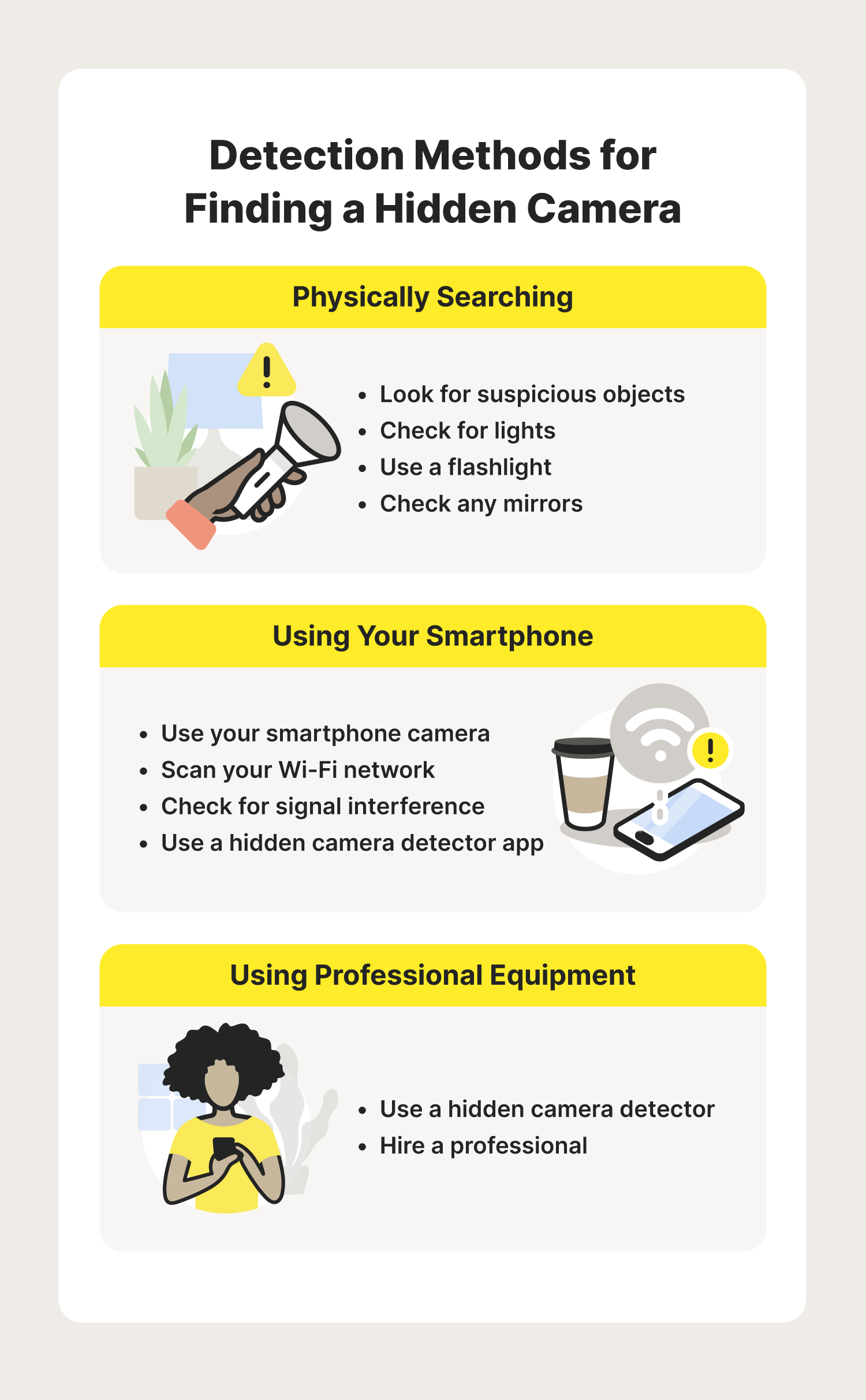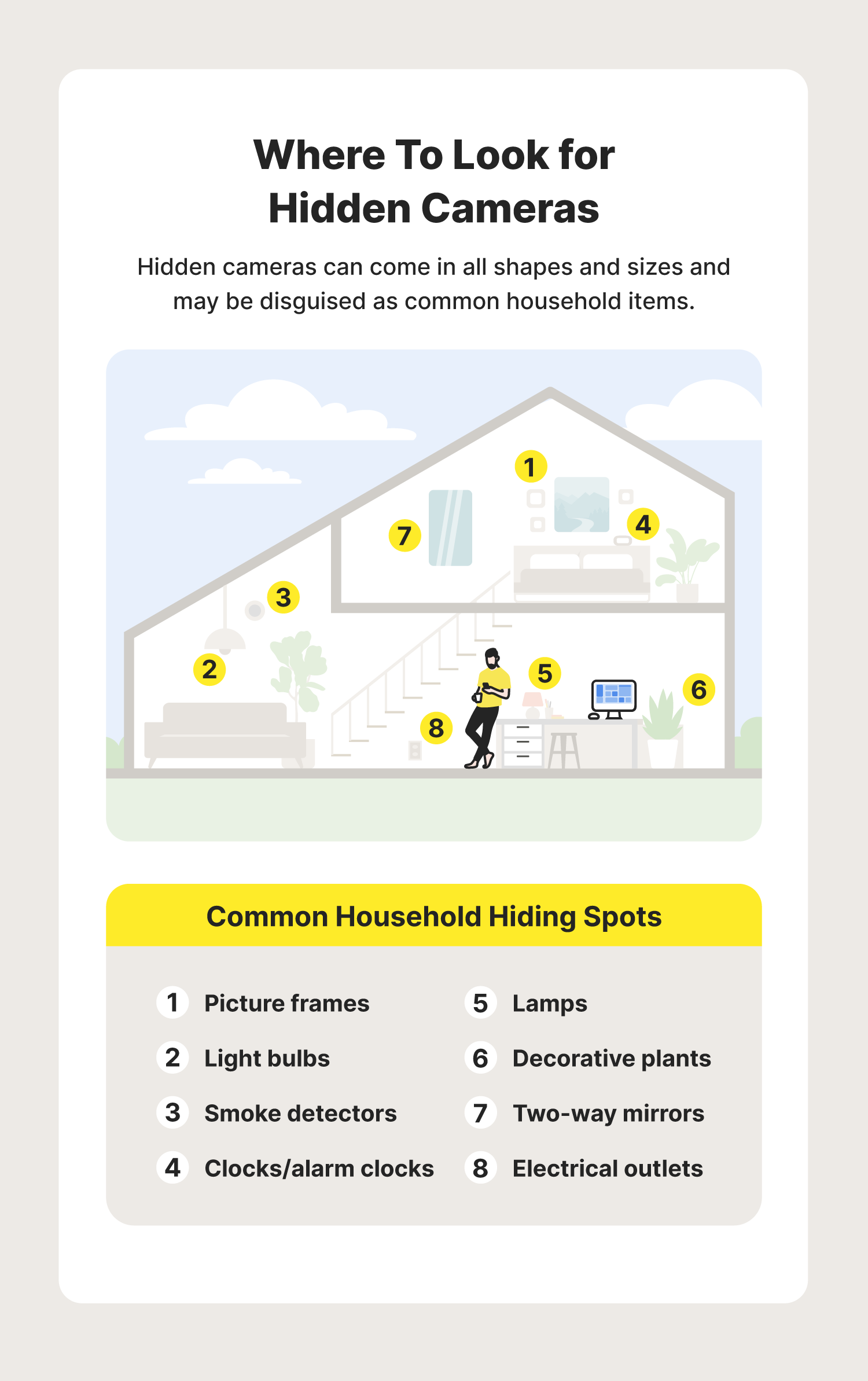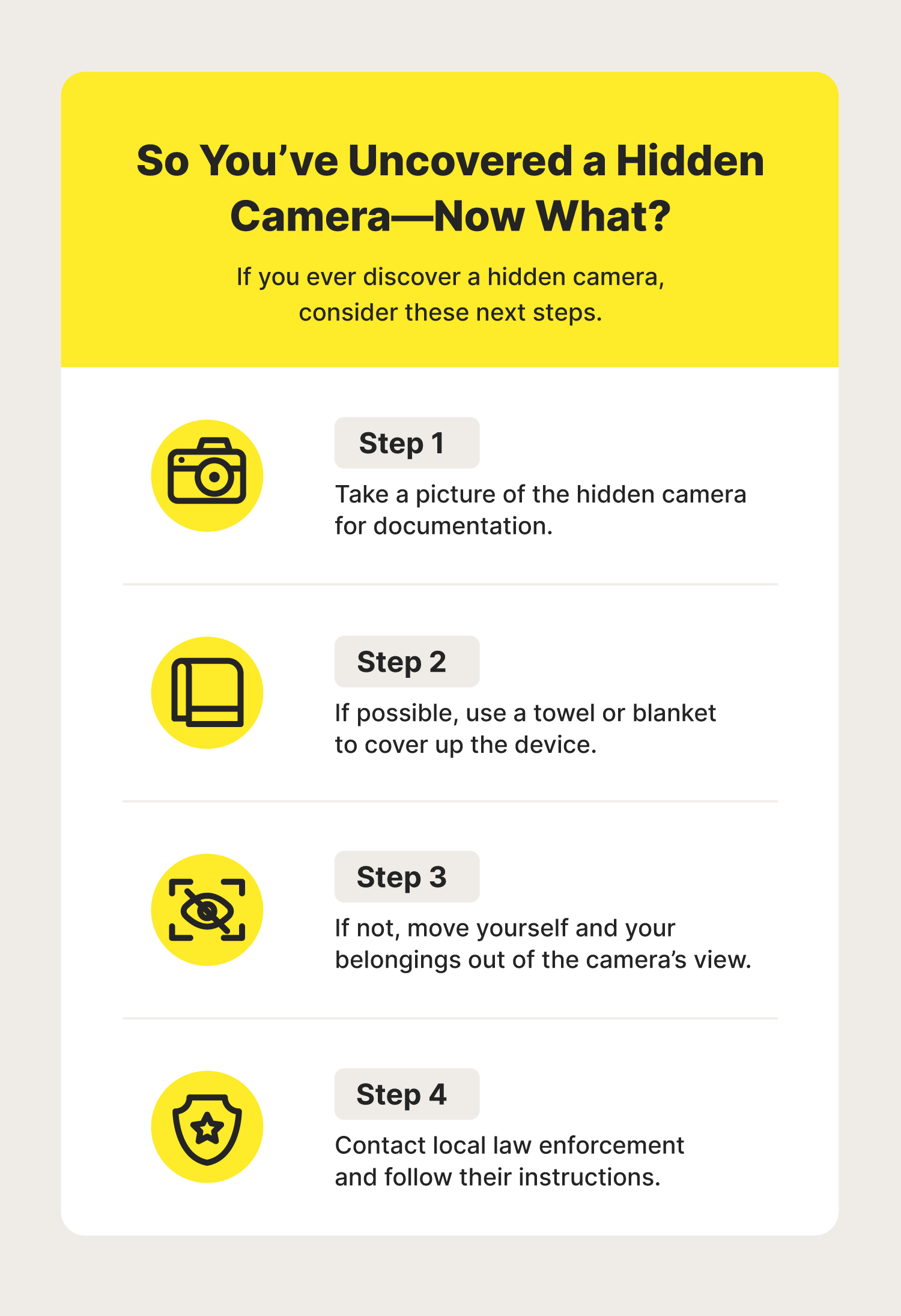How to find hidden cameras: 10 detection methods

Whether it's a hotel or vacation rental, you may wonder about hidden cameras. Follow this guide to learn how to find hidden cameras and help protect your privacy.
Imagine spending the money on a relaxing holiday only to discover you've been watched the entire time.
While this may sound like the plot of a new horror movie, it has unfortunately become a reality for many travellers.
For perspective, more than one in 10 guests have discovered a hidden camera in their vacation rentals.
And it doesn't stop there, as people have discovered hidden cameras in public restrooms, hotel rooms, dressing rooms, and more.
Even though hidden cameras are sometimes used outside the house for home security, some perpetrators may use them for nefarious purposes, such as snooping on your personal life and invading your privacy.
Because of this, knowing how to detect hidden cameras has never been more important to protect your personal privacy. To help you in your search, we’ve pared down 10 different hidden camera detection methods:
Follow this guide to learn more about how to find hidden cameras, their common hiding spots, what they look like, and what to do if you find one.
Let’s get started.

1. Look for suspicious objects
If you think you may be in an area that has hidden cameras, a good starting point is completing a thorough physical search of your surroundings. While scanning the room, keep an eye out for any objects that look out of the ordinary. If it’s an area you've been in before, check and see if anything looks as if it has been moved or rearranged.
During your search, be sure to pay close attention to objects that are commonly used as hidden cameras or as ways to disguise them, including clocks, smoke detectors, wall decor, and USB charging blocks.
If you find anything that appears suspicious, be sure to cover the camera and unplug it if you can. In some cases, hidden cameras may have built-in batteries that allow them to run even after they’re unplugged.
2. Check for lights
Another helpful way to quickly locate a hidden camera is to check for lights. To do this, be sure to get the room as dark as possible. You can do this by waiting until nighttime, closing all your blinds, and shutting off or unplugging any trusted light sources.
Then, look around the room for any objects that emit light. While this isn’t true for all devices, some hidden cameras may have a small LED light that will blink or shine in the darkness.
3. Use a torch
In some cases, you may be able to check for hidden cameras by using a torch. Like the last detection method, you’ll want to get the room as dark as possible. Then, shine the torch around the room and check carefully for any tiny reflections.
These reflections may be blue or purple and could be coming from a small camera lens. Once you see a reflection, make sure you give the object a close inspection to determine if it’s a hidden camera.
4. Check any mirrors
Some clever creeps even go as far as hiding cameras behind a two-way mirror. Fortunately, there is a simple way you can check and see if the mirrors in your area are safe or if they’re two-way mirrors in disguise.
To test your mirror, start by placing the tip of your finger on the surface of the mirror. After doing so, look at the gap between your fingertip and its reflection. If there is a visible gap between the two, it’s a real mirror. If it appears as if your fingertip and its reflection are touching tip to tip, it may be a two-way mirror and could have a camera behind it.
You can also detect a two-way mirror by knocking on it. Knocking on a two-way mirror will result in a hollow sound compared to a real mirror.
5. Use your smartphone camera
Many types of hidden cameras emit infrared light while in use. While you won’t be able to see this yourself, your smartphone might be able to help. To test if your smartphone camera can detect infrared light, you can use an infrared remote control such as a TV remote.
First, try pointing your phone camera at the end of the remote. If your smartphone screen shows a burst of purple or white light, that’s a sign that your camera is picking up the infrared light. In most cases, it will be your device’s front-facing camera that works, as many rear-facing cameras have infrared filters.
If your smartphone passes the remote test, you’ll want to get your room as dark as you can. Then, use your phone camera to scan the room to detect and examine any sources of infrared light.
6. Scan your Wi-Fi network
Some hidden cameras may connect to the internet so they can be monitored remotely. If a hidden camera uses Wi-Fi and is connected to the same network as you, you may have a chance of detecting the camera via a scan of your wireless network.
To scan your Wi-Fi network to detect hidden cameras, you’ll first need to download a network scanning application. To do so, open your smartphone's native app store and search “network scanner.” Once you find an application you like, install it and follow the instructions.
For a network scanner to work, you’ll need to be connected to the Wi-Fi router you’re looking to scan. While looking at the app’s results, keep an eye out for any device names that you don’t recognise or seem suspicious, like “IPcamera,” for example.
7. Check for signal interference
In addition to infrared light, many surveillance cameras also emit radio waves that can disrupt nearby phone calls. For example, you may experience annoying buzzing or crackling during a phone call if you’re close to a hidden camera.
To use this detection method, call a family member or friend and ask them to stay on the line. During your call, slowly walk around the area and listen closely for any interference. If you notice a decrease in call quality in certain areas, you may be close to a hidden camera. If so, check the area thoroughly for anything suspicious.
Keep in mind that this method isn’t a guarantee, as not all cameras will interfere with a phone call. On the flip side, your phone could be interfering with other signals or have bad reception unrelated to a hidden camera.
8. Use a hidden camera detector app
Another way you can use your smartphone to help find hidden cameras is to download a hidden camera detector app. When searching for a hidden camera detector app, be sure to stick to your device’s native app store, as third-party app stores may contain malware.
This method is a solid option for detecting hidden cameras because many of the apps combine multiple techniques, including Wi-Fi scanning, Bluetooth scanning, and infrared detection. Once you’ve downloaded the app, be sure to carefully follow the instructions to ensure you’re taking the best steps to find a hidden camera.
9. Use a hidden camera detector
As an alternative method to smartphone apps, you can purchase a specialised device to find hidden cameras. These spy camera detectors work by scanning for radio frequency (RF) signals, which are electromagnetic waves used by hidden cameras and other electronics to transmit information through the air. These devices can be found online at websites such as Amazon, with prices ranging from $20 to hundreds of pounds.
If you go this route, be sure to carefully follow the instructions that come with your device. Common household items such as kitchen appliances, Wi-Fi routers, and TVs may interfere with your detection device, so unplugging them is the safest bet. When in doubt, refer to the manual that came with your device to best perform your hidden camera search.
While this is a more expensive method in comparison to the others, these devices are specifically designed for locating hidden cameras. If the other detection methods are unsuccessful and you’re still suspicious that there is a camera in your area, purchasing a hidden camera detector may be worth the investment.
Please note that certain hidden cameras can use multiple frequencies that alternate rapidly and may be undetectable to some hidden camera detectors. Fortunately, surveillance cameras with such capabilities are much more expensive and are less likely to be used.
10. Hire a professional
Whether the other detection methods come up short or you’d rather sit back and let the pros do the work for you, hiring an expert can be a reliable way to ensure the area is free of any privacy threats.
By hiring a specialist, you can benefit from their expertise and specialized equipment without having to purchase any equipment yourself. When looking for a qualified professional in your area, be sure to do your research and read any available reviews before making your decision.
Most common places to spot hidden cameras

No matter which detection method you use, there are common objects and places that frequently house hidden cameras. Some hidden cameras can even be as small as a screw, making them difficult to find with a quick glance. Because of this, it’s important that you pay extra close attention to these common objects and hiding spots, including: ·
- Smoke detectors
- Pens Books
- Light bulbs
- DVD cases
- Clocks and alarm clocks
- Soft toys
- Lamps
- Doorbells
- Wall decor
- Power strips
- Decorative plants
- USB charger blocks
- Two-way mirrors
- Night lights
- Air filters
- Small holes in the wall
- Screws
- Computer mice
- Clothes or coat hooks
- Electrical outlets
- Bookshelves
- Showerheads
- Air vents
- Photo frames
- Plug-in air fresheners
- Keyholes
Keep in mind that hidden cameras can come in various shapes and sizes, and this isn't a complete list. While this is a great place to start, nosy perpetrators may have their own unique ways of hiding cameras. Now that you know where to look for hidden cameras, let’s cover what you should do if you find one.
What to do if you find a hidden camera: 5 steps
If you do find a hidden camera in your search, your instinct may be to destroy or disconnect it. This is not advised, as touching it can accidentally ruin any fingerprints that could be useful in an investigation.

Instead, follow these steps:
- Take a picture of the hidden camera for documentation.
- If possible, use a towel or blanket to cover up the device.
- If you can't cover the device, move yourself and your belongings out of the camera’s view.
- Contact local law enforcement and follow their instructions.
If you found a hidden camera in a hotel or vacation rental, you may want to reach out to the hotel or vacation rental company directly. Avoid personally reaching out to the rental host, as it can alert them that they’ve been caught and may prompt them to try to cover their tracks by destroying evidence.
Now that you know how to exercise good cyber hygiene habits like how to find hidden cameras, you can navigate vacation rentals, hotel rooms, and other private spaces with an enhanced sense of privacy. Safe travels!
FAQs about how to find hidden cameras
Still have questions? To learn more about how to find hidden cameras, read through these answers to some commonly asked questions.
Why do people use hidden cameras?
People use hidden cameras for a variety of reasons — some ethical and others not. For example, a vacation rental host may have an outdoor security camera for protection in the event of a break-in. On the other hand, a hidden camera inside the home may be used for nefarious behavior, such as snooping on your personal life.
If you find a hidden camera somewhere you’d expect privacy, such as your home, hotel, rental home, or a public bathroom, it may have been placed by a perpetrator looking to spy on you. In these cases, the camera could be set up to:
- Record you for extortion
- Pull a prank
- Record your intimate moments
- Snoop for confidential personal information
- Capture footage to sell on the dark web
What do hidden cameras look like?
Hidden cameras can come in all shapes and sizes and may be hidden in or disguised as common household objects, such as smoke detectors or USB charger blocks. As a commonality between all cameras, keep an eye out for anything resembling a camera lens.
Can you use your mobile to find hidden cameras?
Yes, you can use your mobile phone to help with finding hidden cameras in your home by:
- Using a spy camera detector app
- Placing a phone call to check for interference
- Using the camera to detect infrared light
- Using a Wi-Fi scanner app
How do people disguise hidden cameras?
There are many ways that someone can disguise a hidden camera. They may purchase one that already looks like a common household item or try to hide it within another object like a photo frame, smoke detector, or two-way mirror.
Are hidden cameras illegal?
Generally speaking, installing hidden cameras is illegal in any area where you have a reasonable expectation of privacy. Because of this, hidden cameras in holiday rentals, self-catering accommodations, hotel rooms, public restrooms, dressing rooms, and other private spaces are illegal.
Keep in mind, however, that cameras can still legally be placed in lobbies or other public spaces for security purposes if you’re informed. For example, Airbnb’s camera policies state that any cameras must be mentioned in the listing for them to be acceptable. Airbnb also mentions that any intentionally concealed recording devices are never permitted.
It's important to note that surveillance laws may differ between states and countries. When in doubt, always contact your local law enforcement whenever you’re dealing with a suspicious surveillance camera.
How do hidden camera detectors work?
Many hidden camera detectors work by scanning for RF signals and then using either a sound and/or a light to indicate its presence, allowing you to easily locate a hidden camera.
How can I disable a hidden camera?
If you find one, disabling a hidden camera is not recommended, as it can destroy any fingerprints that may be useful in a police investigation. Instead, cover up the camera if possible or move yourself and your belongings out of its view.
How to tell if a screw is a hidden camera?
A hidden screw camera will have a noticeably larger screw head compared to most screws. Within this large screw head will be a tiny camera lens. These types of hidden cameras will also have hidden wires connecting the hidden camera to a power source.
Editorial note: Our articles provide educational information for you. Our offerings may not cover or protect against every type of crime, fraud, or threat we write about. Our goal is to increase awareness about Cyber Safety. Please review complete Terms during enrollment or setup. Remember that no one can prevent all identity theft or cybercrime, and that LifeLock does not monitor all transactions at all businesses. The Norton and LifeLock brands are part of Gen Digital Inc.
- 1. Look for suspicious objects
- 2. Check for lights
- 3. Use a torch
- 4. Check any mirrors
- 5. Use your smartphone camera
- 6. Scan your Wi-Fi network
- 7. Check for signal interference
- 8. Use a hidden camera detector app
- 9. Use a hidden camera detector
- 10. Hire a professional
- Most common places to spot hidden cameras
- What to do if you find a hidden camera: 5 steps
- FAQs about how to find hidden cameras





Want more?
Follow us for all the latest news, tips and updates.